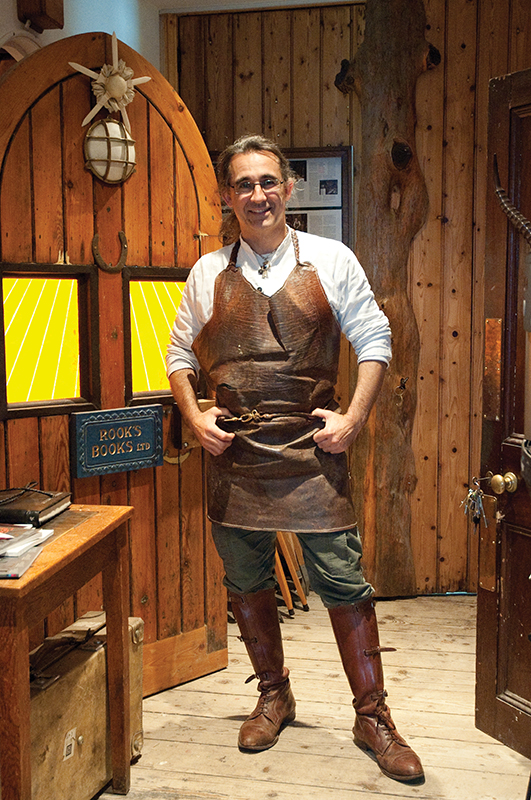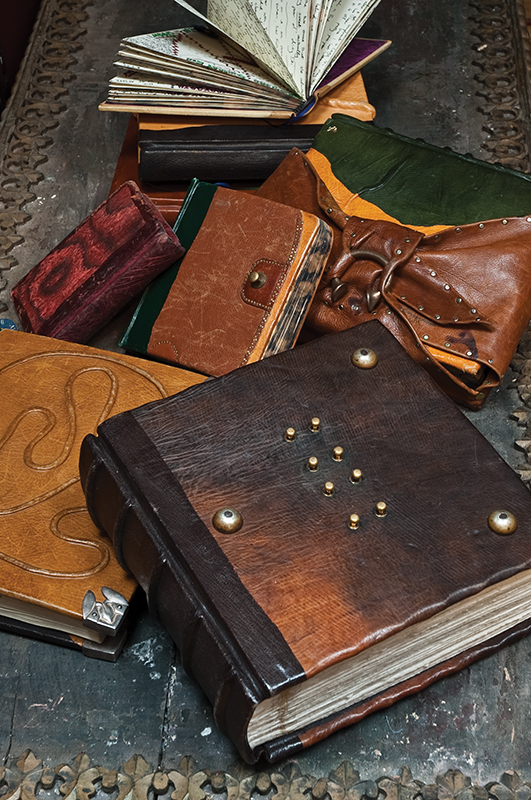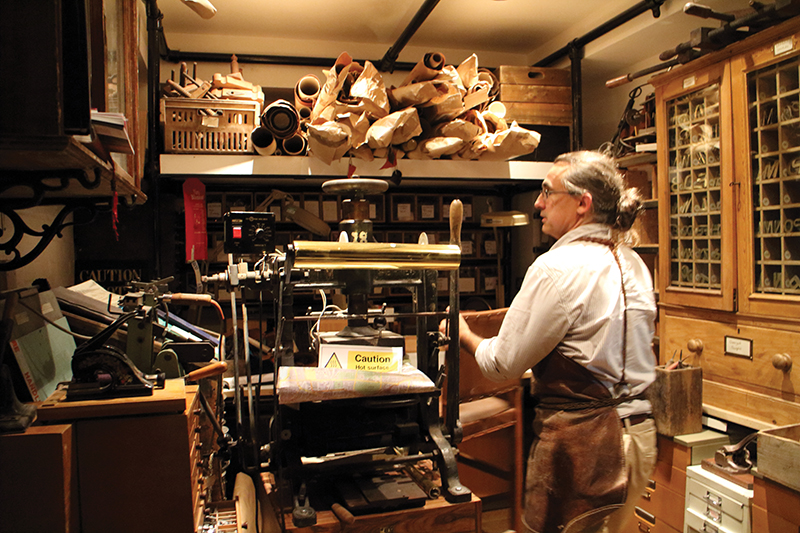Rooks Books produces books (and other leather-wrapped objects) that have a tactile, physical presence while exuding a sense of otherworldly mystery. One might expect to find such volumes in the hands of Gandalf or on the walls of the library at Hogwarts. Each uniquely created binding, made from a vast variety of leathers and other natural skins, seems to say, “touch me, I hold the secrets of the universe.” And yet each commands enough respect to elicit a pause before leafing through the vellum pages, lest one be turned to dust for laying eyes on such knowledge without the proper initiation.

leather apron, tall
leather boots, and with long hair tied up for
work, Gavin Rookledge of Rooks Books looks the
part of an old-world
artisan with a London
hipster’s edge, and yet he is far more than that.
Except as noted,
photographs are by
Debbie Patterson.

highlighting the diversity of Rookledge’s work.
These books are, in fact, not made by elves but are created today in south London by Gavin Rookledge and a team of experts trained in traditional techniques of bookbinding and printing. Some even contain secret compartments that can hide incongruously contemporary iPads for living wizards.
Rookledge, when lecturing to art students, defines the “role of the artist” as being to “make something that defies description.” He uses the examples of the Slinky (the wire spiral toy) and DNA as his acid test: until their invention/discovery they could not be described and one can still find no single synonym to explain what they are.
This philosophy informs the objects he produces. He has consistently sought out that elusive space between categories to navigate the freedom with which to create. Although he applies centuries’ old methods to old-world materials, he does so in highly untraditional ways. His books and other creations are not reproductions. Rather, they are tomorrow’s antiques that keep artisan techniques alive in a wholly living guise.
In a handmade leather apron, tall leather boots, and with long hair tied up for work, Rookledge looks the part of an old-world artisan with a London hipster’s edge, and yet he is far more than that. He confesses that an early interest in theater continues to animate him. However, he attributes the ethos of Rooks Books to an advanced degree course he completed with the University of Exeter in 1987 that combined outdoor studies with fine art. He gives special credit to the mentorship provided by master book designer Faith Shannon.
By choosing this program, which was unique in the U.K. at that time and in which he was the only combined student in his year, Rookledge already evinced a tendency to go against the proverbial grain. However, Exeter provided the skills as well as the intellectual framework in which to conceive of books as a relevant and biodegradable form of art.
Rookledge’s passion for hiking, kayaking, and other adventures has found its way into his workshop with an encyclopedic knowledge about animal and fish skins as well as a conscientious attitude about their use. He has an entire room of examples, including a number of exotic skins given to him by friends and clients that he cordons off in a special “do not use” area because he will not work with anything that might come from an “at risk” species. He notes the stingray, for example, as a fish he will no longer touch in spite of its glorious skin because it is in jeopardy. On principle, he works only with skins from animals killed for use as food and has done considerable research about their origins.
When he founded Rooks Books in 1987 and opened a modest stand in the Greenwich Market, he envisioned this as a secondary, bread-and-butter activity that would fund his “serious” art. However, the business quickly took off beyond anything he could have imagined, eliciting orders from a diverse group of highly placed individuals that includes the queen, Bill Gates, Cher, and institutions such as the Victoria and Albert Museum.
He soon realized that the business required his complete attention and that his artistic ambitions would need to be subsumed into it. Paradoxically, no sooner did he succeed in winning over this discerning clientele than he began to distance himself from being identified as an “artist.”
Rookledge explains that the label left him feeling akin to a “zoo exhibit” in his relationship with patrons. He therefore consciously positioned himself in the role of business proprietor and master craftsman and, in fact, has gone on to create and direct a total of seven registered businesses that operate out of an enclave of buildings at the end of a cul-de-sac not far from Crystal Palace.
Since moving Rooks Books to the premises in 2000, Rookledge has expanded the workshop to two floors with numerous rooms. If the space has been fitted out with all of the practical equipment he requires—presses, a room full of typefaces, and old wooden filing cabinets—it has plenty of whimsy as well—a large fish tank surrounded by a leather-wrapped frame, oversized clocks, all manner of vintage tools and boxes, and a generous sprinkling of quirky treasures that create a playful atmosphere. Rookledge has even built a magical retreat for his three children, which is accessible only by a tiny cubbyhole for a touch of Alice Through the Looking Glass fantasy sprung to life. As he has bought up the surrounding properties he has added a gym, studio space for other craftsmen and artists and is even creating an outdoor movie screening area with vintage seats and lights.
The property speaks to Rookledge’s business acumen. However, it also, in its eccentricities, evidences its owner’s imagination. His ability to think beyond the narrow confines of traditional bookbinding has allowed his company to expand in unexpected ways, most notably the creation of bespoke furniture and interiors for luxurious super yachts.
Serendipity brought him into contact with one of the world’s leading yacht designers, who discovered Rooks Books at a fair. When asked whether he could transpose his bookbinding aesthetic to leather-covered furniture and interiors, Rookledge had the vision to leap into this new enterprise, which now constitutes a large portion of his business.
The company mascot is, in fact, a vintage car wrapped entirely in leather and bedecked with animal horns and artificial flowers for good measure, which he has affectionately named “Miss Hepburnella.”
A current experimental project, undertaken at the behest of a client, entails covering a reproduction of an antique carousel horse to create a freestanding leather sculpture. Rookledge enjoys the process of collaborating with clients, ideally having enough of a brief to understand what they want but the freedom to execute it with originality.
Books, nevertheless, remain core to the business as well as to Rookledge himself. One of his more unusual projects has been to produce a bespoke volume devoted to the connections between golf and sex that has the physical presence and exquisite execution worthy of the princeliest Book of Hours.
Throughout his adult life Rookledge has kept a personal diary that is part schedule and part memoir in a series of hand-produced books reflective of the particular phase he is going through. At a particularly low ebb he utilized a Manilla slave token as the closure to hold together the very generous leather covering that swaddles the pages of this diary. Rookledge explains that this served as a daily reminder of how dark the human condition can be and to celebrate the freedom and opportunities he enjoys.
The darkness coincided with the death of Rookledge’s father just over two years ago. The senior Rookledge, Gordon, continues to loom large as an inspiration and a force to be reckoned with in his son’s eyes. He was a self-made man who left school at fifteen to go on to found three successful companies even as he found time for risky deep-sea diving adventures and to become so knowledgeable about the history of typesetting that his book, Rookledge’s International Typefinder, remains a classic, go-to source to this day.
Gavin Rookledge, so obviously influenced by his father’s business acumen, outdoorsmanship, and admiration for the printed word, chose to mourn his father’s death with what is arguably one of his most masterful, but certainly one of his most personal projects to date. He took an entire month off from professional obligations to create a special binding as well as a requisitely significant box in which to hold a copy of Arthur Rackham’s 1926 gorgeously illustrated edition of The Tempest. Could a more appropriate text, one wonders, be chosen to commemorate such a father?

his two workrooms at
Rooks Books near Crystal
Palace in South London.

The materials selected to enclose the words: “Full fathom five, my father lies…” refer to Shakespeare’s play on many levels: dyed lavender and purple for suitably underwater hues, while a reindeer skin recovered from a Dutch brigantine that sank in 1786 constitutes one of the primary materials. A delicate fringe of mother-of-pearl along the edges of the book recalls “(t)hose are pearls that were his eyes.” Rookledge’s friend, Gabriella Lane, created shell-inspired silver mounts to further embellish this memento mori. However, it is arguably the intentionally frayed, crumbling, and scale-like edges to the book’s cover as well as the seaweed-like ties that hold it together that most poignantly evoke a feeling of this as the treasured remains of what has been lost at sea; or, more precisely, to that rediscovered in new guise after suffering its “sea-change.”
To those who might argue that fine craftsmanship should be considered “an insubstantial pageant faded,” Rooks Books demonstrates that with sufficient space to utilize ancient techniques in new ways, these skills form the basis for such stuff “as dreams are made on.”
